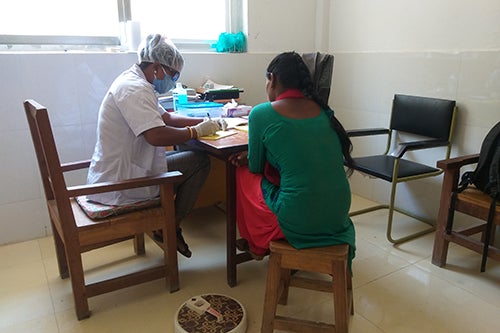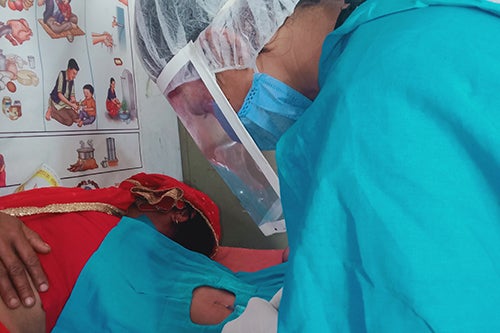News
Meeting family planning needs in Nepal’s quarantine centres
- 23 June 2020
News
KATHMANDU, Nepal – When Kabita Bhandari arrived at a COVID-19 quarantine centre in Baitadi District, in far-western Nepal, residents thought she was bringing food. They soon realized she was delivering another kind of essential supplies: contraceptives.
There were four couples staying at the centre, undergoing a mandatory 14-day quarantine after returning from India. They said the family planning supplies were absolutely needed.
“The women were worried about getting pregnant,” recounted Ms. Bhandari.
She and her colleagues are known as “visiting service providers.” They specialize in delivering family planning information and supplies to remote communities. They often go to great lengths, scaling mountains and crossing rivers, to deliver contraceptives to women who need them.

Amid the COVID-19 pandemic, visiting service providers are coordinating with local authorities to help make sure women do not lose access to these services.
To reach the quarantine centre in Puchaudi Municipality, Ms. Bhandari travelled for five hours in a vehicle, then hiked for three hours over rugged terrain. She advised the couples about the range of family planning options available, free of charge.
“After this session, the four women, all in their mid-30s with three to four children each, came to the nearby health centre,” Ms. Bhandari said, referring to a family planning outreach clinic half an hour from the quarantine centre.
All four of the women chose implants that provide long-lasting contraception. Ms. Bhandari, wearing full-length protective gear, inserted the implants.
Since Nepal’s coronavirus lockdown began in March, visits to health centres have sharply decreased, largely due to transport disruptions and fears of infection.
Experts have been concerned that disruptions in family planning services could result in an increase in unintended pregnancies. This, in turn, could result in “dangerous long-term impacts on women’s health,” explained Dr. Guna Raj Awasthi, the provincial health director in Sudurpaschim.
The visiting service provider programme initially came to a halt when Nepal’s stay-at-home order was announced. Providers tried offering services remotely, but knew that in-person counselling and care was more effective.
They also knew that the communities they serve have the greatest needs. The programme – which is funded by the United Kingdom’s Department for International Development and UNFPA Supplies, and works with federal, provincial and local governments as well as partner organizations MSI Nepal and ADRA Nepal – covers 16 districts that have low contraceptive prevalence rates.
“Whenever I spoke to the district health authorities, we discussed how to resume family planning services under these circumstances,” said Ganesh Shahi, the UNFPA district officer in Baitadi.
“We finally came to an arrangement to issue special travel passes in coordination with authorities so that the providers could go back to work, taking steps to protect themselves. We sought advice from government health officials to select the quarantine centres with families, paving the way for the deployment of visiting service providers.”

Outreach to quarantine centres began on 16 May, starting with Baitadi, where a team of four visiting service providers, in safety gear, reached 14 different health centres.
As of 23 June, they had provided implants to more than 250 women, intrauterine devices to 40 women, and family planning counselling to 720 people across 19 quarantine sites in Baitadi alone. Across 11 districts, in both quarantine centres and the community, more than 950 women had received contraceptive implants, and more than 120 received intrauterine devices during 28 days of the lockdown.
Kala Chaudhary, who coordinates the work of four visiting service providers including Ms. Bhandari, said the work has been rewarding.
“Helping out people in difficult times like this makes us proud,” she said. “We are planning to visit even more quarantine sites to reach as many as women and men as possible.”
Dr. Awasthi said he admires their dedication: “It’s heartening to see how motivated they are to continue their important work. We cannot let the progress we have made in averting unplanned pregnancies slip due to coronavirus.”
– Santosh Chhetri